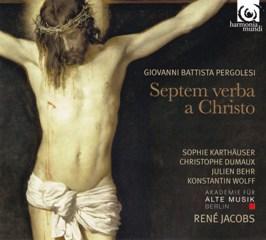Pergolesi - Septem verba a Christo (2013)
Pergolesi - Septem verba a Christo (2013)

Verbum I: Pater, dimitte illis: non enim sciunt qui faciunt 1. Huc o dilecti filii (Rec, Christus) 2. En doceo diligere (Aria) 3. Quod iubes, magne Domine (Aria, Anima) Verbum II: Amen dico tibi: hodie mecum eris in Paradiso 4. Venite, currite (Rec, Christus) 5. Latronem hunc aspicite (Aria) 6.Ah! peccatoris supplicis (Aria, Anima) Verbum III: Mulier ecce filius tuus 7. Quo me, amor? (Rec, Christus) 8. Dilecta Genitrix (Aria) 9. Servator optime (Rec, Anima) 10. Quod iubes, magne Domine (Aria) Verbum IV: Deus meus, deus meus, ut quid dereliquisti me? 11. Huc oculos (Aria, Christus) 12. fflicte, derelicte (Aria, Anima) Verbum V: Sitio 13. O vos omnes, qui transitis (Aria, Christus) 14. Non nectar, non vinum, non undas (Aria, Anima) Verbum VI: Consummatum est 15. Huc advolate mortales (Aria, Christus) 16. Sic consummasti omnia (Aria, Anima) Verbum VII: Pater, in manus tuas commendo spiritum meum 17. Quotquot coram cruce statis (Rec, Christus) 18. In tuum, Pater, gremium (Aria) 19. Quid ultra peto vivere (Aria, Anima) Sophie Karthäuser (soprano) Christophe Dumaux (countertenor) Julien Behr (tenor) Konstantin Wolff (bass) Akademie für Alte Musik René Jacobs – conductor
When two 18th century manuscripts of the Seven Words of Christ came to light in 1930, attributed by copyists to “Sig. Pergolese”, a debate was sparked as to their authenticity. Was it indeed a work by Giovanni Battista Pergolesi, composer of the Stabat Mater? Or, had it simply been misattributed? No one could say for sure. The conductor Hermann Scherchen tried to shift the attention back to the quality of the work itself, calling it “one of the most heartfelt works of art, full of profound tenderness and an all-conquering sense of beauty”.
However, unattributed 18th-century works don't tend to rack up a great deal of performances, regardless of their profundity, and this one was no exception. Further sets of manuscript parts were found over the years. But still it wasn't until 2009, when musicologist Reinhard Fehling discovered a set of performance manuscripts, that the music could finally be traced back to Pergolesi without an actual autograph score.
Subsequently, the work was given its concert premiere at the Beaune Festival in July 2012, and this world-first recording was made a few days later. Listening to the work, it's hard to see what the authenticity hoo-hah was about. Certainly it's very different to Pergolesi's sublime Stabat Mater. But there are plenty of his stylistic thumbprints.
This “heartfelt work of art” is indeed as wonderful as Scherchen described. Scored for four solo vocalists, trumpet, two horns, harp, strings and basso continuo, the Seven Words of Christ is a cycle of seven cantatas, each consisting of two arias. Recitatives are kept to a minimum. Essentially a dialogue between Christ on the cross and the “Anima” (Faithful Soul), the tone is reverent, devotional, with some striking instrumental symbolism injecting some unusual colouring.
A solo horn denotes Christ's kingliness, muted trumpet symbolises his veiled divinity as he suffers on the cross, and a focus on the timbre of violas over violins adds further melancholy. Most of all, though, the work is beautiful, and its deeply spiritual loveliness has been realised in a fine period performance. Certainly, it won't be languishing in dusty libraries any more.
It is, in its own way, just as sublime as the Stabat Mater, and René Jacobs and his musicians have given it a comprehensive rehabilitation. --- Charlotte Gardner, bbc.co.uk
download: uploaded yandex 4shared mediafire solidfiles mega filecloudio nornar ziddu
Last Updated (Wednesday, 12 March 2014 10:33)








